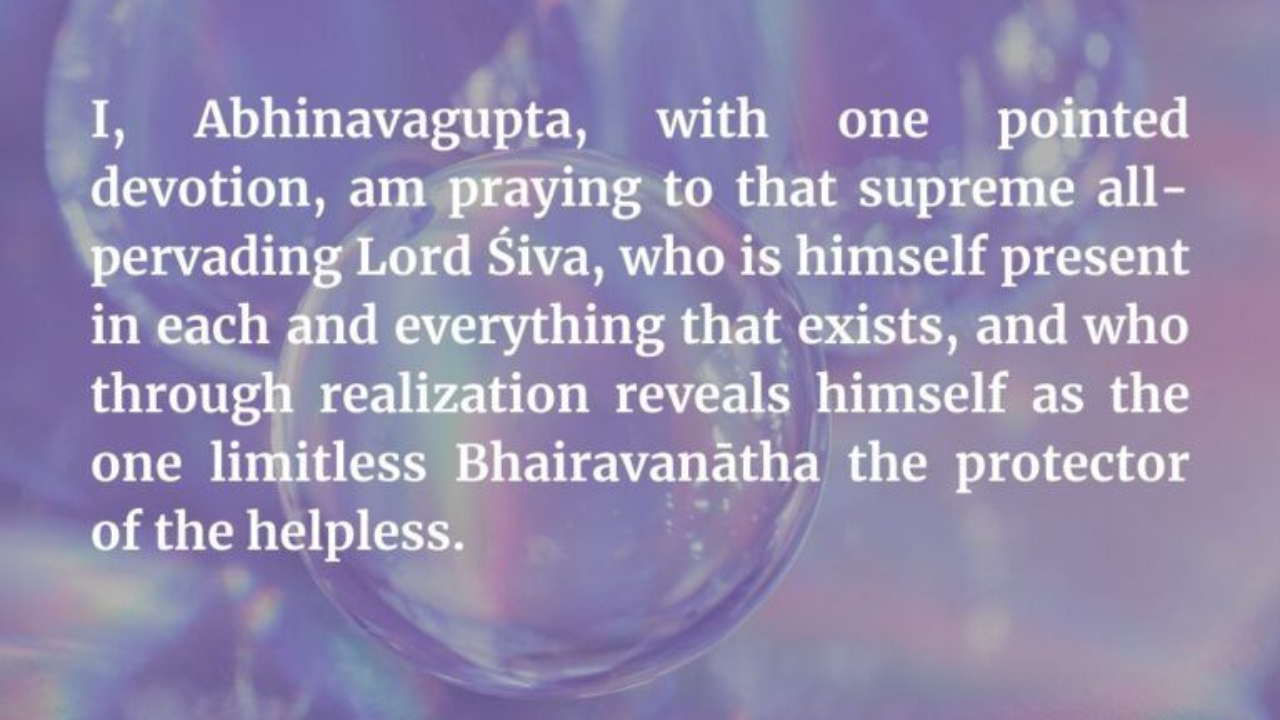
This is an excerpt from Swami Lakshmanjoo’s publication: Light on Tantra in Kashmir Shaivism – Abhinavagupta’s Tantraloka Volume 2 Chapters Two & Three.
Tantrāloka is the voluminous masterwork of the 10th-century philosopher-saint Abhinavagupta. It is a veritable encyclopedia of non-dual Shaivism, a spiritual treasure trove containing a glorious synthesis of all the schools that make up Kashmir Shaivism.
This second volume includes chapters two and three, dealing with Anupāya, the means (upāya...

This is verse 9 of the Bodhapañcadaśikā by Abhinavagupta, who wrote the [15 verses of wisdom] for ‘those dear devotees who are not intellectually inclined”. The Bodhapañcadaśikā, Abhinavagupta’s “Fifteen Verses of Wisdom” is available as part of the "Self Realization in Kashmir Shaivism" by Swami Lakshmanjoo.
In this excerpt Swami Lakshmanjoo answers the question “Why our masters have explained to meditate.”

In this excerpt from the translation of chapter 6, verses 21 to 24, of Abhinavagupta’s commentary on the Bhagavad Gita Swamiji explains the stages of mind and the joy of an appeased mind in Kashmir Shaivism.
In the summer of 1987 Swami Lakshmanjoo began compiling important verses from the various scriptures he had studied throughout his life. Each Sunday he would distribute one or two slokas to devotees, at the same time giving in brief their essential meaning. In all Swamiji revealed a total o...
In this excerpt from the Essence of the Supreme Reality: Abhinavagupta’s Paramarthasara, Swami Lakshmanjoo reminds us that “No matter what happens, go on remembering God and He will carry you.”
PS DVD 5 (00:42:39)
तस्मात् सन्मार्गेऽस्मिन्
निरतो यः कश्चिदेति स शिवत्वम् ।
इति मत्वा परमार्थे
यथातथापि प्रयतनीयम् ॥१०३॥
tasmāt sanmārge’smin
nirato yaḥ kaścideti sa śivatvam /
iti mat...
From an article from the Speaking Tree by John Hughes (revised)…

Universe as Divine Play of Diversity and Duality.
Abhinavagupta tells us in his Tantraloka that “Moksha only exists when your being becomes absolutely independent. According to him, a yogi can only be said to be liberated when he possesses this absolute independence; nothing must limit him or overshadow his universal consciousness. This process begins when the yogi is experiencing the state of internal mystical awareness, reli...

Abhinavagupta tells us that there is a war going on between our senses. In the senses there is joy, and joy fights with sadness, sadness fights with joy. In this excerpt, we will learn what a yogi must do in this internal battle.
This video snippet is part one of the Essence of the Bhagavad Gītā, as composed by the renowned 10th-century CE philosopher/saint Abhinavagupta. There are eighteen saṅgraha ślokas, which are based on Abhinavagupta’s illuminating and original commentary, known as th...

Swami Lakshmanjoo explains what “causes” grace in Kashmir Shaivism and what are the “signs” by which you can understand that grace is there.
This is an excerpt from Abhinavagupta’s Tantraloka 13th anika, which we discussed during the online course “Grace on the Spiritual Path“.

vairāgyaṁ bhogavairasyaṁ
dharmaḥ ko’pi vivekitā /
satsaṅgaḥ parameśāna-
pūjādyabhyāsanityatā // 98 //
āpatprāptistannirīkṣā
dehe kiṁcicca lakṣaṇam /
śāstrasevā bhogasaṁgha-
pūrn...
Abhinavagupta’s Bhairava Stotra is a unique hymn that is a part of the Sacred Verses for Sunday Puja. Swamiji revered these verses, as he did all of the works of Abhinavagupta. He would request his devotees to recite the Bhairava Stotra regularly, and it was always recited at the end of any major spiritual function at his ashram in Kashmir.
These verses encapsulate the entire philosophy and experience of Kashmir Shaivism, so we wanted to share them with everyone, as they are very uplifting, esp...
This is a lecture that explains the Aghora Mantra in detail. In the summer of 1989, John Hughes received a letter from Swami Lakshmanjoo writing to him about the Aghora Mantra and its importance, after having the darshan of Svachanda Bhairava. In the following excerpt from the Weekly Sangha, you will learn more about this mantra and its significance for Kashmir Shaivism and your own practice, and the whole world.
This is the first part in a two-part series. In part two we go deeper into what is...









